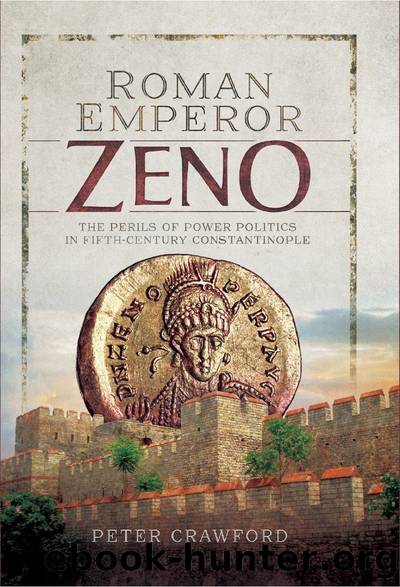Roman Emperor Zeno by Peter Crawford

Author:Peter Crawford [Peter Crawford]
Language: eng
Format: epub
Influencing Zeno: Peter the Fuller and Acacius
It is difficult to ascertain the doctrinal beliefs of Zeno before or after he acceded to the throne. Isauria was largely pro-Chalcedon but the influence of Antioch, which became increasingly Miaphysite as the fifth century progressed, might reflect Zenoâs beliefs and policies. That assumes that Zeno was closely linked with the religious persuasion of his native Isauria. One later source, Michael Psellus, regarded Zenoâs father as being a Catholic, but then this source regards Leo I as Zenoâs natural father. It has also been suggested that Zeno had to be baptized due to being a pagan when he arrived in Constantinople, although anti-Zenoid sources would have made more of this.³¹ Being considered a potential ally of Leo I, Zeno likely held orthodox beliefs. He certainly cannot have been an Arian or a clearly defined heretic in the mid-460s.
Development of Zenoâs doctrinal beliefs may be detected in his relationship with Peter the Fuller. A monk of Constantinople, Peter left the capital for Antioch around the same time that Zeno was appointed magister militum per Orientem in 469. The sources disagree about the exact nature of their relationship. Some see Peter befriending Zeno, joining his retinue and accompanying him to Antioch.³² Others do not record any real acquaintance before their arrival in Antioch, suggesting that the Fuller fled east because his Christological beliefs were becoming increasingly incompatible with the Chalcedonian capital.³³ In Antioch, Peter fell in with the local anti-Chalcedonians,³ⴠalthough there is very little evidence of a strictly anti-Chalcedonian stance held by him at this time. He appears more hostile to Nestorianism, while leading anti-Chalcedonians treated him with a lot of mistrust.³âµ
As seen earlier, Peter and his allies orchestrated the flight of the Antiochene patriarch Martyrius and saw Peter consecrated as his successor, much to the chagrin of Leo, who had Peter deposed in 471. The sources accuse Zeno of varying levels of complicity. Opponents saw him as the Fullerâs protector, aiding in the removal of Martyrius and pressuring the Antiochenes to accept Peter as patriarch at the Synod of Seleucia.³ⶠThe Roman tradition of Liberatus and the Gesta de nomine Acacii give no mention of Zeno playing a part in the removal of Martyrius or the elevation of Peter, but it is difficult to make any argument from that silence. On top of that, the Roman tradition may rely on the account of Acacius, who is unlikely to highlight how the emperor supported a heretic.³ⷠHowever, this does not confirm Zenoâs complicity. Perhaps he was left with little choice, with Peter and his allies threatening an escalation in violence. The accusations of Nestorianism made against Martyrius and the Synod of Seleucia provided a cover for Zenoâs actions having been somewhat forced upon him. This would in turn mean that little can be derived of Zenoâs personal beliefs from his association with the Fuller.³â¸
Regardless of what role he had played in Peterâs elevation, the judgement of Leo in early 471 meant that Zeno was to restore Martyrius and depose the Fuller and exile him to Upper Egypt.
Download
This site does not store any files on its server. We only index and link to content provided by other sites. Please contact the content providers to delete copyright contents if any and email us, we'll remove relevant links or contents immediately.
Blood and Oil by Bradley Hope(1561)
Wandering in Strange Lands by Morgan Jerkins(1419)
Ambition and Desire: The Dangerous Life of Josephine Bonaparte by Kate Williams(1389)
Daniel Holmes: A Memoir From Malta's Prison: From a cage, on a rock, in a puddle... by Daniel Holmes(1333)
Twelve Caesars by Mary Beard(1315)
It Was All a Lie by Stuart Stevens;(1296)
The First Conspiracy by Brad Meltzer & Josh Mensch(1167)
What Really Happened: The Death of Hitler by Robert J. Hutchinson(1163)
London in the Twentieth Century by Jerry White(1146)
The Japanese by Christopher Harding(1133)
Time of the Magicians by Wolfram Eilenberger(1126)
Twilight of the Gods by Ian W. Toll(1118)
Cleopatra by Alberto Angela(1094)
A Woman by Sibilla Aleramo(1092)
Lenin: A Biography by Robert Service(1075)
John (Penguin Monarchs) by Nicholas Vincent(1068)
Reading for Life by Philip Davis(1024)
The Devil You Know by Charles M. Blow(1024)
The Life of William Faulkner by Carl Rollyson(984)
